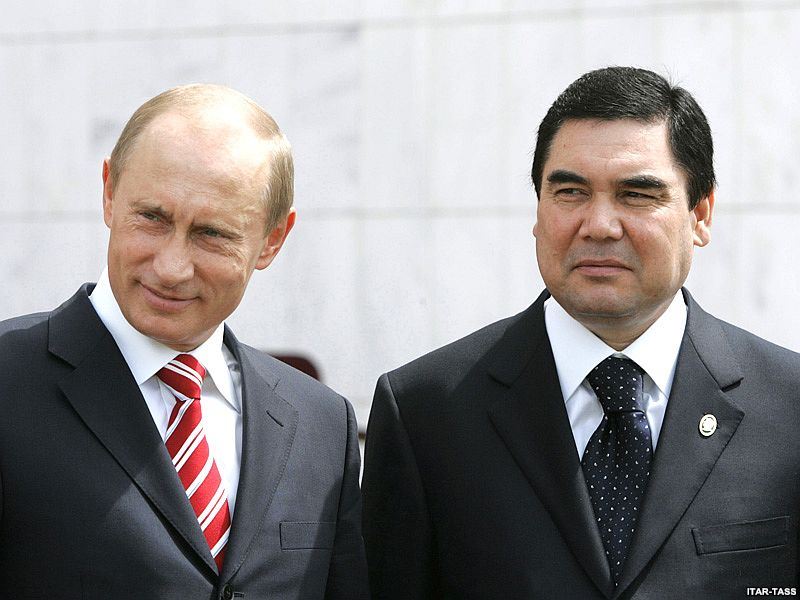Turkmenistan, the most reclusive nation in Central Asia, moved to revive relations with Russia. However, both nations seem to remain slow to find common grounds on energy and security issues.
This week, Turkmenistan’s President Gurbanguly Berdymukhamedov traveled to Russia seeking revival of bilateral ties. During a meeting with President Vladimir Putin on November 1, Berdymukhamedov hailed relations of “strategic partnership” between Russia and Turkmenistan. In a perceived exercise of Central Asian flattery, Berdymukhamedov promised to remain a reliable partner of “great Russia.”
In response, Putin noted remaining “unsolved issued” in relations between Russia and Turkmenistan. He also said that bilateral trade was down if calculated in US dollars, but refrained from disclosing any numbers.
Bottom of Form
Turkmenistan’s president’s trip to Russia came after a long hiatus. Berdymukhamedov last visited Russia in December 2011, and traveled to the Caspian summit in Astrakhan, Southern Russia, in September 2014. In contrast, this year Putin held eight bilateral meetings with Kazakhstan’s President Nursultan Nazarbayev.
Berdymukhamedov’s pledges of “strategic partnership” with “great Russia” sounded somehow at variance with Turkmenistan’s official policy of neutrality. Berdymukhamedov was understood to be seeking Russian support so as to deal with Turkmenistan’s economic problems and security concerns.
Relations between Russia and Turkmenistan have reached new lows following Moscow’s decision to halt bilateral gas trade. In January 2016, Russia’s gas monopoly Gazprom decided to discontinue imports of Turkmen gas. Simultaneously, Gazprom indicated plans to increase imports of gas from other Central Asian suppliers.
The end of Turkmen gas exports to Russia had apparent economic reasons. In 2015, Gazprom was purchasing Turkmen gas at US$240/thousand cubic meters (tcm), well above European prices estimated at below US$200/tcm. In contrast, China was purchasing Turkmen gas at US$185/tcm, although these funds were understood to be largely reinvested in development of Turkmenistan’s gas sector infrastructure.
Moscow’s move to halt imports of Turkmen gas followed Ashgabat’s positive gestures towards Russia. In December 2015, President Berdymukhamedov suggested to continue cooperation with Russia and Kazakhstan to build the Russia-oriented Pricaspiysky pipeline.
Russia, Turkmenistan and Kazakhstan signed an agreement to build the 1,700-kilometer Pricaspiysky pipeline system back in December 2007. This pipeline was supposed to funnel 40 billion cubic meters (bcm) of Central Asian natural gas per annum, including 30 bcm from Turkmenistan and 10 bcm from Kazakhstan, along the Caspian shores to Russia. But this project was not implemented. Russian officials also promised to invest in the “East-West” pipeline 733-kilometer pipeline with a capacity of 30 bcm/year that connected Eastern and Western Turkmenistan at an estimated cost of US$1.5 billion.
Since 2009, Russia and Turkmenistan refrained from mentioning the planned Pricaspiysky gas pipeline. Both sides also failed to sign an agreement on the East-West pipeline.
Subsequently, Turkmenistan’s gas exports to Russia have been undergoing a steep decline. Gazprom’s purchases of gas from Turkmenistan went down to 4 bcm in 2015, from 40 bcm in 2008, and about 10 bcm/year in 2009-2014.
Energy disagreements between Moscow and Ashgabat resurfaced last year. In July 2015, TurkmenGaz accused Gazprom of failing to fully pay for gas. Gazprom responded by filing a case against TurkmenGaz at the international arbitration court in Stockholm over gas supply contract prices.
In mid-2015, Turkmen officials were also accusing Gazprom of failing to deliver on Russia’s earlier promises to invest in the “East-West” and the Pricaspiysky gas pipelines. But later Turkmenistan backed down from these accusations.
Yet despite Ashgabat’s efforts to mend bilateral energy ties, Moscow apparently remained reluctant to revive the gas partnership between Russia and Turkmenistan. In September 2016, Gazprom indicated plans to refrain from purchasing Turkmen gas till 2018.
Gazprom’s refusal to import as little as 4 bcm/year of Turkmen gas came as a sensitive financial blow to Turkmenistan as the country’s state coffers lost about US$1 billion/year. Not surprisingly, Ashgabat is seeking to revive energy partnership with Moscow.
This year, Russia’s top-level security officials traveled to Ashgabat to discuss regional security, notably the situation near the border between Turkmenistan and Afghanistan. Moscow has repeatedly pledged to counter possible infiltration of militant groups from Afghanistan into Central Asia.
In June, Russia’s defense minister Sergei Shoigu visited Turkmenistan to discuss military cooperation, but both sides did not disclose any specific agreements. Ashgabat was understood to remain reluctant to accept any possibility of direct military involvement of Moscow or Russia-led security groupings in efforts to protect the border with Afghanistan. Instead, Ashgabat was heard seeking increased supplies of military hardware from Russia.
Yet despite Berdymukhamedov’s optimistic pronouncements, it is still far from certain whether Moscow and Ashgabat could agree on energy and security issues any time soon. Therefore, “unsolved issued” are likely to remain in relations between Russia and Turkmenistan for some time to come.



























